History
Stanwell Fields Curriculum Intent
Throughout the school, our work is based on principles which are shared by all staff. It is our belief that we should:
-
develop and value the whole child and enable them to flourish as individuals.
-
give children the opportunity to learn about the wider world and their place within it.
-
ensure children have the knowledge and skills needed to achieve during the next stage of their education and in the future.
-
give children the opportunity to enjoy learning, flourish and achieve in a peaceful, supportive environment of Christian love and care and build respectful relationships.
To read more about out aims and curriculum intent, please visit our curriculum page.
History: Purpose of Study
A high-quality history education will help pupils gain a coherent knowledge and understanding of Britain’s past and that of the wider world. It should inspire pupils’ curiosity to know more about the past. Teaching should equip pupils to ask perceptive questions, think critically, weigh evidence, sift arguments, and develop perspective and judgement. History helps pupils to understand the complexity of people’s lives, the process of change, the diversity of societies and relationships between different groups, as well as their own identity and the challenges of their time.History: Aims
The national curriculum for history aims to ensure that all pupils:
- know and understand the history of these islands as a coherent, chronological narrative, from the earliest times to the present day: how people’s lives have shaped this nation and how Britain has influenced and been influenced by the wider world
- know and understand significant aspects of the history of the wider world: the nature of ancient civilisations; the expansion and dissolution of empires; characteristic features of past non-European societies; achievements and follies of mankind
- gain and deploy a historically grounded understanding of abstract terms such as ‘empire’, ‘civilisation’, ‘parliament’ and ‘peasantry’
- understand historical concepts such as continuity and change, cause and consequence, similarity, difference and significance, and use them to make connections, draw contrasts, analyse trends, frame historically-valid questions and create their own structured accounts, including written narratives and analyses
- understand the methods of historical enquiry, including how evidence is used rigorously to make historical claims, and discern how and why contrasting arguments and interpretations of the past have been constructed History – key stages 1 and 2
- gain historical perspective by placing their growing knowledge into different contexts, understanding the connections between local, regional, national and international history; between cultural, economic, military, political, religious and social history; and between short- and long-term timescales.
We follow the national curriculum for History. The programmes of study for key stage one and two can be found below:
History at Stanwell Fields
History at Stanwell Fields is delivered using the Cornerstones Curriculum of knowledge rich projects.
These projects are designed to deliver the requirements of the national curriculum in an in-depth and engaging way. Children study 2 main knowledge rich projects across the course of the year and also cover history objectives throughout other projects.
Within each project, children have the opportunity to develop historical knowledge and skills. They will complete an innovate task in each that is designed as a chance for them to demonstrate this new learning. For example, in Year 1, children put together an assembly for parent based on their School Days project; during the Year 2 project of Magnificent Monarchs, children create a board game based on the lives of six significant sovereigns; in Year 4, children record an edition of the Ancient Times podcast about the Coppergate dig during their Invasion project and in Year 6, children create a digital memorial book to commemorate some of the people from our local area who died during conflict during Britain at War.
History Milestones


